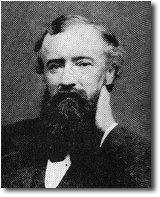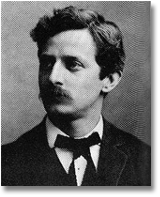Where Emily found Whitman
December 9th, 2009
The video is cut off because the battery died. Ironically, my animal finding whitman partner, opted to leave at almost exactly the same time. I chose to keep that video, rather than reshoot it with a fresh battery, because Simon’s exit is very Whitmanesque and goes perfectly with the excerpt from “Song of Myself” I was reading.
I apologize about the quality of the picture and sound.
Emily for Dec. 3
December 3rd, 2009
So, I’ve been dealing with Whitman’s disciples this week, and how they each believed the good grey poet was more than human and that his work would survive in the future generations. In some ways they were right. Whitman’s poetry continues to be read. He is remembered and has statues built in his image, libraries, schools, and bridges in his name.
All of these thoughts regarding Whitman’s legacy have been circling around in my skull, as I’m using the topic in my final project/paper. Naturally, for me that is, my ipod plays a major role in my daily life, which, of course, includes my thought processes, reading, and writing. There are very few times when I’m not working to music in the background. So when Katatonia’s “Burn the Remembrance” came up on my ipod, I started connecting it to my thoughts on Whitman’s legacy, legacies in general, and how we remember things. The song, in plot/story, has little to do with Whitman; it’s about a breakup and the aftermath–and how those memories remain, hence the title. However, the band, like Whitman, tends to get philosophical in their lyrics. They ask very deep questions about legacies and memories–and how they aren’t always what we want to live on after us, or during our lifetimes.
Here is the song on youtube: Burn the Remembrance
As a side note, the first 10, or so, times I’ve heard this song, I thought the chorus was “Words will replace us” instead of “What will replace us?” That misunderstanding actually affected the way I think about writing. Honestly, the song is great the way it is, but I think it would be even better if they replaced “What” with”Words.”
Visitors’ Center Script: Whitman’s Disciples, part three
December 3rd, 2009

My first disciple is John Burroughs. Like Kevin explained about Maurice Bucke, Burroughs imagined himself a friend and disciple of Whitman before they had even met. Burroughs acts as a loyal friend and defender to Whitman two years prior to meeting him: “In 1862 he had frequently visited Pfaff’s beer cellar, a bohemian watering hole and the center of literary life in Manhattan. There Burroughs championed Whitman in literary arguments, anticipating at every moment a meeting with the poet himself” (Sarracino). This is a behavior Burroughs would continue to exhibit toward Whitman after they became friends and throughout their friendship.
In 1864 Burroughs and Whitman met, by chance, in Washington D.C. Whitman was heading toward the army hospital, so he invited the unemployed Burroughs along. Burroughs got a job nursing the wounded, but he didn’t have the stomach for it and quickly left. Even though Burroughs’s employment at the hospital didn’t last, his friendship with Whitman would last until the poet’s death—and beyond.
Burroughs held several odd jobs, none of which lasted long to the chagrin of his wife, Ursula, but he always wanted to write. Under Whitman’s tutelage and encouragement, Burroughs developed his writing skills, sending pieces to magazines while working at his day jobs. Eventually, with Whitman’s help, he discovered his niche in writing about nature; he had an amazing eye for the details of nature, which in turn inspired Whitman to sharpen his eye for his poetry. Once again, Whitman’s relationship with his friend/disciple involved giving and receiving advice: It was a true friendship, not a one-sided relationship.
Burroughs’s behavior also reveals a proto-feminist perspective in Whitman. When Burroughs and his wife were having marital problems, Whitman sided with Ursula, always. He chastised Burroughs for his infidelity and insisted Ursula’s lack of sexual interest in Burroughs was a result of his failings to earn her love. This is a very interesting defense of the wife of a friend. Naturally, Ursula was a good friend of Whitman, though not a disciple.
There is also a quasi-sexual element between Burroughs and Whitman. I’m not claiming that they were lovers, though it is a possibility that can never be proven, but I thought it was very interesting that Burroughs referred to the love of his life (not Ursula) as “Whitmanesque.” She could have been described as beautiful, or intelligent, or any other adjective, but Burroughs chooses to describe her in similar terms as his dead friend. Clearly, this is an indication of the love and devotion Burroughs felt for Whitman, which persisted after the poet’s death and remained until his own death.
Like Bucke, Burroughs also wrote a biography of Whitman, Notes on Walt Whitman, which was also edited and partially written by Whitman. It also isn’t very objective. In his introduction, Burroughs includes inflated language about how Whitman isn’t appreciated in his own time, but will one day be absorbed by America—in the way Whitman sought to be absorbed.
Click here for Notes on Walt Whitman

My next disciple is Horace Traubel who, unlike the previous disciples, was only fourteen when he met Whitman in Camden in 1873. Because of the vast age difference between Traubel and Whitman, there were whisperings and rumors of a sexual nature among the neighbors. Again, there is no evidence of anything sexual in their relationship, but there is a quasi-sexual element present between them.
Traubel viewed himself as Whitman’s son, and he played the role of a devoted son—even after Whitman’s death. He tended to Whitman as he was ailing, carefully writing a journal/book With Whitman in Camden. In his note to readers in With Whitman in Camden, Traubel explains his motivation for writing the book and how it is designed to honor Whitman’s wishes.
Click here for the first part of With Whitman in Camden
Traubel writes about how he will tell the truth about Whitman in his final months because that is how the poet wanted to be remembered.
Growing up, Traubel was increasingly interested in reform and read Leaves of Grass as having a socialist agenda. He received confirmation from a reluctant Whitman. In any event, Traubel’s work was to take what he felt Whitman started in Leaves of Grass and extend it to be even more radical with a major socialist slant. Traubel wrote his own books, but they can be read as “socialist refigurings of Whitman’s work” (Folson). His work as a radical reformist made it difficult for him to find and keep a good job. So, he lived a relatively impoverished life.
A few days before he died in 1919, Traubel saw a vision of Walt Whitman beckoning him to the afterlife. Again, this is an example of Whitman having the divine meaning of a demigod for his disciples. Traubel is buried in Harleigh Cemetery close by Whitman’s tomb—like a son would be buried nearby a father.
Works Cited
Folsom, Ed. “Disciples: Biography, Horace Traubel.” The Walt Whitman Archive, 2009. Web. 28 Nov. 2009.
Sarracino, Carmine. “Disciples: Biography, John Burroughs.” The Walt Whitman Archive, 2009. Web. 29 Nov. 2009.